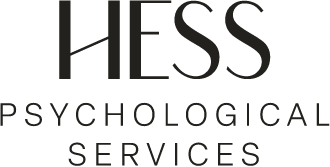The experience of trauma can impact our lives in many ways. Irritability, difficulty sleeping, memory issues, substance abuse, hypervigilance, difficulty maintaining relationships with others, and avoidance are common for those who have witnessed or experienced a traumatic event. At Hess Psychological Services, we will develop a comprehensive approach to explore your thoughts and feelings about your trauma and learn how to cope with the results of those events. Recovery from trauma will not mean that the event did not occur, but rather it will no longer define you.
What Is Post-Traumatic Stress Disorder (PTSD) / Trauma?
PTSD (post-traumatic stress disorder) is a severe response to exposure to trauma, or particularly distressing events in a person’s life. Trauma refers to the emotions you experience during and immediately after a traumatic event. The effects of trauma can last from a few days to a few months to even years. The effects of trauma can transcend all areas of life if not treated properly.
Common Causes of PTSD / Trauma
While PTSD and trauma can be caused by any number of life events and traumatic experiences, some are more common than others. Childhood abuse, natural disasters, serious injury or accidents, or any event that is emotionally or physically harmful or life-threatening can bring on mental health problems, PTSD, and trauma.
PTSD Symptoms
When you have experienced a traumatic event, you may notice some physical and emotional disturbances to your normal self. Those who develop PTSD and trauma can see symptoms such as:
- Being jumpy or easily startled.
- Feeling tense, on guard, or on edge.
- Difficulty falling asleep or staying asleep.
- Trouble concentrating.
- Engaging in risky or self-destructive behavior.
- Feeling irritable, angry, or aggressive.
- Avoidance of certain people, places, or events
- Recurrent distressing memories, dreams, or flashbacks to the event
- Feeling estranged from others
Modalities of Post-Traumatic Stress Disorder Treatments
What defines a trauma is different for every person. Trauma responses and PTSD are both the result of you surviving an extraordinary event. While physical injuries will heal with time, the mental health problems gained require patient, empathetic, and holistic treatment with a mental health professional. At Hess Psychological Services, we offer PTSD/ trauma treatment in the form of psychotherapy, such as trauma-informed cognitive behavioral therapy (or cognitive processing therapy) and prolonged exposure therapy, to help restore your confidence and comfort.
Self-Help Tips for Post-Traumatic Stress Disorder and Trauma
PTSD and trauma symptoms require professional treatment, but there are some self-help tips you can take when not in treatment to help alleviate some of your symptoms. Establishing a routine, exercising regularly, building a support system and attending support groups or group therapy, practicing mindfulness, and sticking to a healthy lifestyle can all help manage the symptoms of PTSD and trauma.
Schedule a Consultation
If you are struggling with feelings of fear, anxiety, and distress after a traumatic event, it is time to get the help you deserve. At Hess Psychological Services, we are dedicated to helping our clients restore confidence and peace in their lives. To schedule a consultation with founder Dr. Heather Hess or one of her team members, please fill out an online contact form.
Frequently Asked Questions about PTSD / Trauma
What is PTSD?
Post-Traumatic Stress Disorder (PTSD) is a mental health condition triggered by experiencing or witnessing a traumatic event. Symptoms may include flashbacks, nightmares, severe anxiety, and uncontrollable thoughts about the event.
What are common symptoms of PTSD?
Common symptoms include reliving the traumatic event through flashbacks or nightmares, avoiding situations that remind you of the event, negative changes in beliefs and feelings, being easily agitated, and hyperarousal (being easily startled or feeling on edge).
How is PTSD diagnosed?
PTSD is diagnosed through a comprehensive evaluation by a mental health professional, which includes discussing symptoms, medical history, and the traumatic event. Diagnostic criteria from the DSM-5 may be used.
What treatment options are available for PTSD?
Treatment options include psychotherapy (such as Cognitive Behavioral Therapy and EMDR), medications (such as antidepressants), and support groups. A combination of these treatments is often most effective.
Can PTSD be cured?
While there is no definitive cure for PTSD, many people find significant relief from symptoms through treatment. With proper care, individuals can learn to manage their symptoms and lead fulfilling lives.
How does Hess Psychology approach PTSD therapy?
Hess Psychology employs evidence-based approaches to PTSD therapy, such as Trauma Informed- Cognitive Behavioral Therapy (T-CBT), narrative therapy, IFST, and trauma-focused therapy. These methods help individuals process traumatic experiences and develop coping mechanisms.
Can children receive PTSD therapy at Hess Psychology?
Yes, children can receive PTSD therapy at Hess Psychology. The approach is tailored to the childs developmental level and may include play therapy, family therapy, and other techniques designed to help children process trauma in a safe and supportive environment.
What should I expect during my first PTSD therapy session?
During the first PTSD therapy session, the therapist will conduct an initial assessment to understand the individuals history and symptoms. This session involves discussing the trauma, setting therapy goals, and developing a treatment plan tailored to the individuals needs.
How long does PTSD therapy typically last?
The duration of PTSD therapy varies based on the individuals progress and the severity of symptoms. Some people may benefit from short-term therapy lasting a few months, while others may require longer-term support. The therapist will regularly review progress to adjust the treatment plan as needed.
What types of trauma does Hess Psychology treat?
Hess Psychology treats various forms of trauma, including but not limited to sexual or physical assault, accidents, loss of loved ones, child abuse, and natural disasters.
How long does PTSD treatment typically last at Hess Psychology?
The duration of PTSD treatment varies, but effective psychotherapies usually require weekly visits for about 3-4 months.
What evidence-based therapies does Hess Psychology use for PTSD treatment?
Hess Psychology employs evidence-based treatments such as Cognitive Processing Therapy (CPT), Prolonged Exposure (PE), and trauma informed cognitive behavioral therapy (T-CBT).
Can medication be part of PTSD treatment at Hess Psychology?
Yes, Hess Psychology may recommend antidepressants or anti-anxiety medications as part of a comprehensive PTSD treatment plan, when appropriate.
How does Hess Psychology help clients feel safe during trauma therapy?
Hess Psychology creates a safe, trauma informed, supportive environment for trauma processing, using techniques like gradual exposure and coping skills development to ensure client comfort throughout treatment, as well as ensuring the office is structured in a way that promotes emotional safety.
What are common symptoms of PTSD that trauma therapy can address?
PTSD symptoms include flashbacks, nightmares, emotional numbness, hypervigilance, and avoidance of trauma-related triggers. Therapy helps manage these symptoms effectively.
What types of trauma-focused therapies are available?
Popular options include Trauma Informed Cognitive Behavioral Therapy (T-CBT), Eye Movement Desensitization and Reprocessing (EMDR), and Prolonged Exposure Therapy (PE). Each is tailored to the individual’s needs.
Can trauma therapy help with childhood trauma?
Yes, trauma therapy is highly effective in addressing unresolved childhood trauma by helping individuals process emotions and develop coping mechanisms.
How long does it take to recover from PTSD through therapy?
Recovery time varies depending on the severity of symptoms and individual progress but typically requires months to years of consistent therapeutic intervention.
Is group therapy beneficial for PTSD treatment?
Group therapy provides a supportive environment where individuals can share experiences and learn coping strategies from others facing similar challenges.
What are common signs of PTSD that residents in Grand Rapids, Rockford, and Comstock Park should watch for?
Common signs include flashbacks, nightmares, intrusive memories, hypervigilance, avoidance behaviors, and difficulty maintaining relationships or responsibilities.
What trauma therapies are available in the Grand Rapids area?
We offer a range of trauma therapies including EMDR, Acceptance and Commitment Therapy (ACT), exposure therapy, and trauma-focused cognitive-behavioral therapy for clients in Grand Rapids, Rockford, and Comstock Park.
Can trauma counseling help if I’m not sure my experience qualifies as PTSD?
Yes, trauma counseling can help you process distressing experiences and symptoms, even if you are unsure whether your experience meets the criteria for PTSD.
How does trauma therapy support recovery for clients in Rockford and Comstock Park?
Trauma therapy provides a safe, nonjudgmental space to process your experiences, develop coping skills, and reclaim your sense of safety and well-being, tailored for residents in Rockford, Comstock Park, and Grand Rapids.
Are sessions for PTSD and trauma therapy available online for Grand Rapids-area residents?
Yes, we offer both in-person and online sessions, making trauma and PTSD therapy accessible to clients throughout Grand Rapids, Rockford, and Comstock Park.
TELEHEALTH
We extend our support beyond physical boundaries, offering confidential and convenient online sessions.
Learn More
Hess Psychological Services was founded during COVID when I witnessed an explosion of individuals needing help dealing with the stressors of life. We have since expanded and have a brick-and-mortar location in Comstock Park, Michigan. Our team of therapists is growing and I am honored to work alongside other clinicians with a similar passion for helping others.



